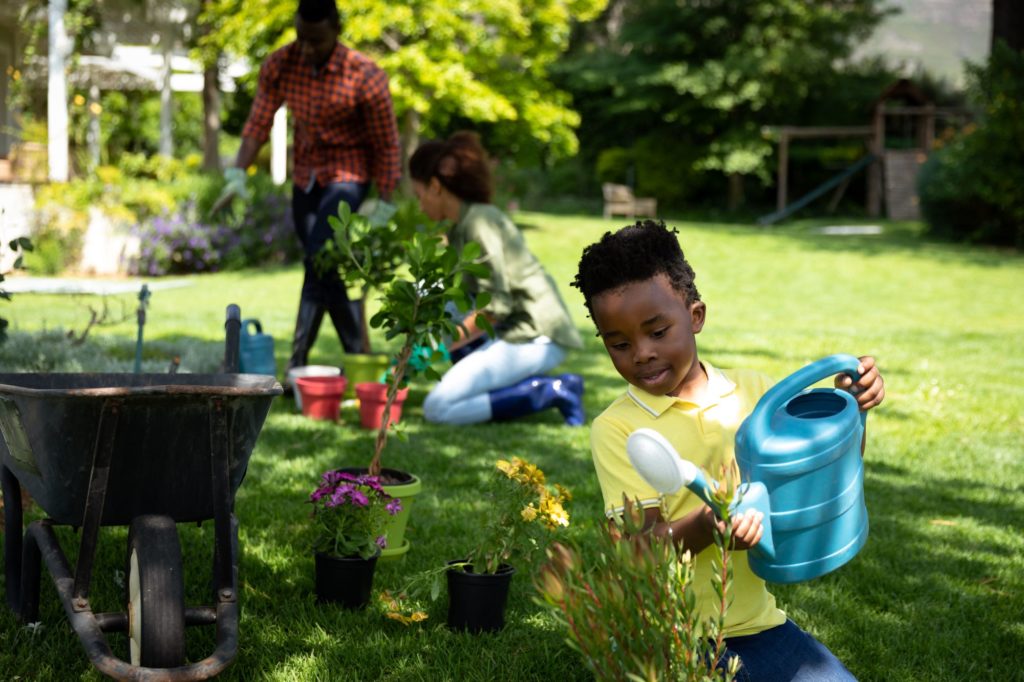Gardening can be a wonderful family activity that provides educational experiences and a way to bond while spending time outdoors. Including children in gardening projects not only teaches them about nature and science, but it also encourages creativity and responsibility. Here are a few gardening tasks and activities that are great for the whole family!
1. Create a Pizza Garden
Plant a pizza ingredients garden to excite every member of the family! Choose a sunny spot to plant tomatoes, peppers, onions, and a selection of herbs like basil and oregano. Kids will love the idea of growing ingredients for a pizza and will learn about how different plants grow and what they need to thrive.
2. Incorporate Native Plants
Consider planting native plants that attract pollinators and are good for your region’s ecosystem! Caring for these native plants can help children learn about their importance as well as the role of pollinators in our ecosystem.

3. Build a Fairy Garden
Let your child’s imagination soar by creating a fairy garden. Use small plants, pebbles, and miniature accessories to build a magical, fairy-sized landscape. This project can be done in a small corner of your garden or in a container, allowing for versatility in any space.
4. Decorate Garden Rocks
Collect rocks and let kids paint them with designs or labels for different parts of the garden. These can mark plant types or just add color and fun to your garden beds.
5. Start a Compost Pile
Teach children about composting and decomposition by setting up a compost bin. They can learn which types of kitchen waste can be composted and watch as organic materials break down over time into nutritious soil. Bonus points if you are vermicomposting—finding worms is fun!
6. Create a Garden Photo Journal
Encourage children to create a photo journal of the garden as it grows. They can take pictures of the plants at different stages, from sprouting to full bloom or harvest. This activity teaches them about plant growth cycles and also allows them to practice photography and documentation skills. They can compare the growth from week to week and observe changes in the plants and wildlife that visit the garden. You also get to see the garden from their eyes!
7. Do Insect Identification
Turn the garden into a mini biology lab by having kids find and identify insects. Give them a simple field guide or use a mobile app to help them learn about the types of insects that live in their garden. This activity can teach them about the roles different insects play in the ecosystem.
8. Measure Plant Growth
Set up a regular routine where children can measure and record the growth of certain plants. Give them a ruler or measuring tape and a notebook to chart the plant’s height, number of leaves, or flower/fruit count. This ongoing project teaches them about how plants grow and can also incorporate basic math skills as they track changes over time. It can be particularly exciting for kids to see fast-growing plants like sunflowers shoot up over the summer!
9. Make Garden Art Projects
After some of your garden flowers or vegetables have grown, use them for fun art projects. Cut vegetables like okra, peppers, or tomatoes in half, dip them in paint, and make prints on paper. This activity can be a creative way to teach children about the shapes and textures of different vegetables.
If you grew flowers, have your child pick a few of their favorites. Press them between sheets of wax paper and place heavy books on top. After a few weeks, you can use these pressed flowers to make cards, bookmarks, or other floral crafts.
10. Create a Garden Treasure Hunt
Organize a treasure hunt where children can follow clues around the garden leading to a hidden treasure. Make clues that encourage them to identify certain plants, find certain items, or do certain tasks, which will engage them with their environment while they have fun outdoors.
Involving your children in the garden gives them a chance to play outside in the dirt while learning valuable hands-on lessons about nature, science, and responsibility. These family-oriented activities are designed to make gardening an enjoyable experience for children, encourage imagination, boost critical thinking, and inspire creativity!